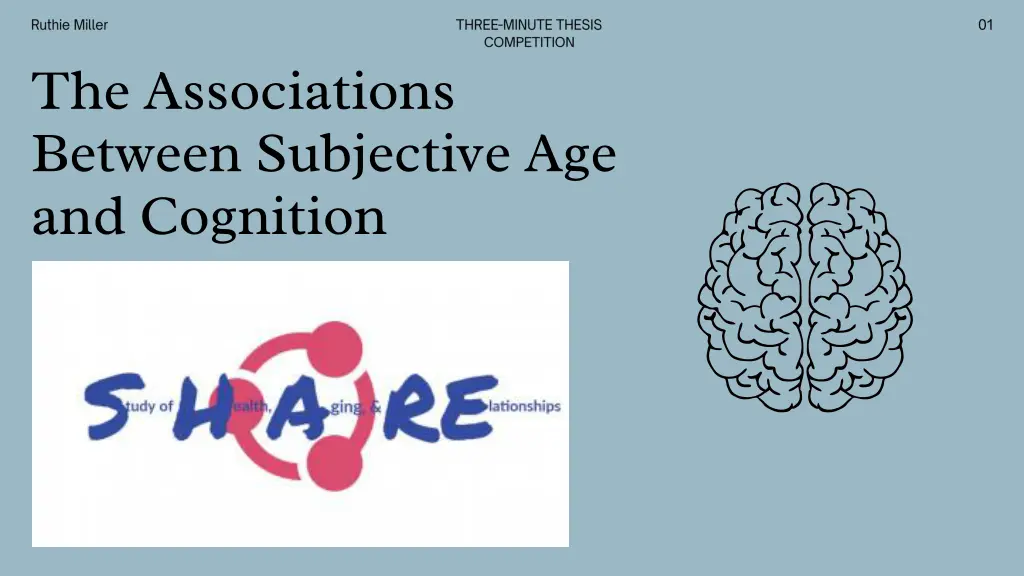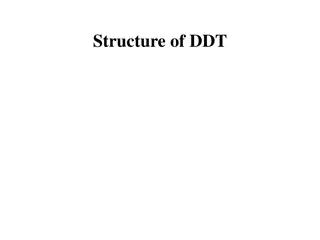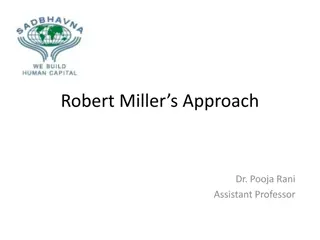
Associations Between Subjective Age and Cognition: A Comprehensive Overview
Explore the fascinating links between subjective age and cognitive function, uncovering patterns across the lifespan. Delve into the research questions, hypotheses, and variables involved, shedding light on the gap in current literature. Discover the impact of subjective age on memory recall, executive function, and chronological age, with insightful results presented.
Download Presentation

Please find below an Image/Link to download the presentation.
The content on the website is provided AS IS for your information and personal use only. It may not be sold, licensed, or shared on other websites without obtaining consent from the author. If you encounter any issues during the download, it is possible that the publisher has removed the file from their server.
You are allowed to download the files provided on this website for personal or commercial use, subject to the condition that they are used lawfully. All files are the property of their respective owners.
The content on the website is provided AS IS for your information and personal use only. It may not be sold, licensed, or shared on other websites without obtaining consent from the author.
E N D
Presentation Transcript
The Associations Between Subjective Age and Cognition
What is subjective age? What patterns does it follow over the lifespan?
What relation does it have to cognition? What gap is there in the literature?
Research Question Hypotheses Subjective Age Memory Recall ChronologicalAge Subjective Age Executive Function ChronologicalAge Sample
Subjective Age X Memory Recall Subjective Age Executive Function X X Chronological Age Chronological Age Results
References Alonso Debreczeni, F., & Bailey, P. E. (2021). A Systematic Review and Meta-Analysis of Subjective Age and the Association With Cognition, Subjective Well-Being, and Depression. The Journals of Gerontology: Series B, 76(3), 471 482. https://doi.org/10.1093/geronb/gbaa069 Ayalon, L., & Tesch-R mer, C. (Eds.). (2018). Contemporary Perspectives on Ageism (Vol. 19). Springer International Publishing. https://doi.org/10.1007/978-3-319-73820-8 Bergland, A., Nicolaisen, M., & Thorsen, K. (2014). Predictors of subjective age in people aged 40 79 years: A five-year follow-up study. The impact of mastery, mental and physical health. Aging & Mental Health, 18(5), 653 661. https://doi.org/10.1080/13607863.2013.869545 Chang, E.-S., Kannoth, S., Levy, S., Wang, S.-Y., Lee, J. E., & Levy, B. R. (2020). Global reach of ageism on older persons health: A systematic review. PLOS ONE, 15(1), e0220857. https://doi.org/10.1371/journal.pone.0220857 Choi, E. Y., Kim, Y. S., Lee, H. Y., Shin, H. R., Park, S., & Cho, S. E. (2019). The moderating effect of subjective age on the association between depressive symptoms and cognitive functioning in Korean older adults. Aging & Mental Health, 23(1), 38 45. https://doi.org/10.1080/13607863.2017.1390733 Eibach, R. P., Mock, S. E., & Courtney, E. A. (2010). Having a senior moment : Induced aging phenomenology, subjective age, and susceptibility to ageist stereotypes. Journal of Experimental Social Psychology, 46(4), 643 649. https://doi.org/10.1016/j.jesp.2010.03.002 Galambos, N. L., Turner, P. K., & Tilton-Weaver, L. C. (2005). Chronological and Subjective Age in Emerging Adulthood: The Crossover Effect. Journal of Adolescent Research, 20(5), 538 556. https://doi.org/10.1177/0743558405274876 Gana, K., Alaphilippe, D., & Bailly, N. (2004). Positive illusions and mental and physical health in later life. Aging & Mental Health, 8(1), 58 64. https://doi.org/10.1081/13607860310001613347 Hess, T. M., Auman, C., Colcombe, S. J., & Rahhal, T. A. (2003). The Impact of Stereotype Threat on Age Differences in Memory Performance. The Journals of Gerontology. Series B, Psychological Sciences and Social Sciences, 58(1), P3 P11. https://doi.org/10.1093/geronb/58.1.P3 Hess, T. M., & Hinson, J. T. (2006). Age-related variation in the influences of aging stereotypes on memory in adulthood. Psychology and Aging, 21(3), 621 625. https://doi.org/10.1037/0882-7974.21.3.621 Hess, ThomasM., Hinson, JoeyT., & Hodges, ElizabethA. (2009). Moderators of and Mechanisms Underlying Stereotype Threat Effects on Older Adults Memory Performance. Experimental Aging Research, 35(2), 153 177. https://doi.org/10.1080/03610730802716413 Hughes, M. L., Geraci, L., & De Forrest, R. L. (2013). Aging 5 Years in 5 Minutes: The Effect of Taking a Memory Test on Older Adults Subjective Age. Psychological Science, 24(12), 2481 2488. https://doi.org/10.1177/0956797613494853 Hughes, M. L., & Lachman, M. E. (2018). Social Comparisons of Health and Cognitive Functioning Contribute to Changes in Subjective Age. The Journals of Gerontology. Series B, Psychological Sciences and Social Sciences, 73(5), 816 824. https://doi.org/10.1093/geronb/gbw044 Kleinspehn-Ammerlahn, A., Kotter-Gruhn, D., & Smith, J. (2008). Self-Perceptions of Aging: Do Subjective Age and Satisfaction With Aging Change During Old Age? The Journals of Gerontology Series B: Psychological Sciences and Social Sciences, 63(6), P377 P385. https://doi.org/10.1093/geronb/63.6.P377 Kornadt, A. E., Hess, T. M., Voss, P., & Rothermund, K. (2016). Subjective Age Across the Life Span: A Differentiated, Longitudinal Approach. The Journals of Gerontology Series B: Psychological Sciences and Social Sciences, gbw072. https://doi.org/10.1093/geronb/gbw072
References, cont. Kotter-Gr hn, D., Neupert, S. D., & Stephan, Y. (2015). Feeling old today? Daily health, stressors, and affect explain day-to-day variability in subjective age. Psychology & Health, 30(12), 1470 1485. https://doi.org/10.1080/08870446.2015.1061130 Levy, B. (1996). Improving memory in old age through implicit self-stereotyping. Journal of Personality and Social Psychology, 71(6), 1092 1107. https://doi.org/10.1037/0022- 3514.71.6.1092 Levy, B. (2009). Stereotype Embodiment: A Psychosocial Approach to Aging. Current Directions in Psychological Science, 18(6), 332 336. https://doi.org/10.1111/j.1467- 8721.2009.01662.x Levy, B., & Langer, E. (1994). Aging free from negative stereotypes: Successful memory in China among the American deaf. Journal of Personality and Social Psychology, 66(6), 989 997. https://doi.org/10.1037/0022-3514.66.6.989 Levy, B. R., Zonderman, A. B., Slade, M. D., & Ferrucci, L. (2012). Memory Shaped by Age Stereotypes over Time. The Journals of Gerontology: Series B, 67(4), 432 436. https://doi.org/10.1093/geronb/gbr120 Rubin, D. C., & Berntsen, D. (2006). People over forty feel 20% younger than their age: Subjective age across the lifespan. Psychonomic Bulletin & Review, 13(5), 776 780. https://doi.org/10.3758/BF03193996 Shao, J., Xiao, L., Zhang, L., & Xin, Z. (2020). Feeling younger, remembering better : The effect of experimentally induced subjective age on memory performance among Chinese older adults. Aging & Mental Health, 24(1), 73 80. https://doi.org/10.1080/13607863.2018.1523875 Shrira, A., Bodner, E., & Palgi, Y. (2014). The interactive effect of subjective age and subjective distance-to-death on psychological distress of older adults. Aging & Mental Health, 18(8), 1066 1070. https://doi.org/10.1080/13607863.2014.915925 Stephan, Y., Caudroit, J., & Chalabaev, A. (2011). Subjective health and memory self-efficacy as mediators in the relation between subjective age and life satisfaction among older adults. Aging & Mental Health, 15(4), 428 436. https://doi.org/10.1080/13607863.2010.536138 Stephan, Y., Chalabaev, A., Kotter-Gruhn, D., & Jaconelli, A. (2013). Feeling Younger, Being Stronger : An Experimental Study of Subjective Age and Physical Functioning Among Older Adults. The Journals of Gerontology Series B: Psychological Sciences and Social Sciences, 68(1), 1 7. https://doi.org/10.1093/geronb/gbs037 Stephan, Y., Sutin, A. R., Caudroit, J., & Terracciano, A. (2016). Subjective Age and Changes in Memory in Older Adults. The Journals of Gerontology Series B: Psychological Sciences and Social Sciences, 71(4), 675 683. https://doi.org/10.1093/geronb/gbv010 Stephan, Y., Sutin, A. R., Luchetti, M., Aschwanden, D., & Terracciano, A. (2021). Subjective age and multiple cognitive domains in two longitudinal samples. Journal of Psychosomatic Research, 150, 110616. https://doi.org/10.1016/j.jpsychores.2021.110616 Stephan, Y., Sutin, A. R., & Terracciano, A. (2015). How Old Do You Feel? The Role of Age Discrimination and Biological Aging in Subjective Age. PLOS ONE, 10(3), e0119293. https://doi.org/10.1371/journal.pone.0119293 Uotinen, V., Rantanen, T., Suutama, T., & Ruoppila, I. (2006). Change in Subjective Age among Older People over an Eight-Year Follow-Up: Getting Older and Feeling Younger? Experimental Aging Research, 32(4), 381 393. https://doi.org/10.1080/03610730600875759





















